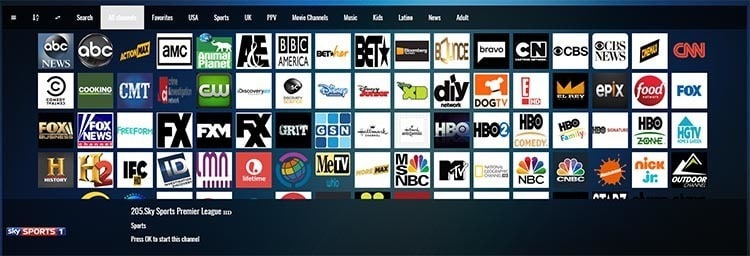Charting a New Course: The Reason IPTV is the Future of Watching
Within today's dynamic digital landscape, the method we consume media is evolving more rapidly than at any time in the past. Traditional cable television is slowly giving way to more flexible and innovative options, with Internet Protocol Television (IPTV) rising as a pioneer. As viewers increasingly seek personalized content and on-demand access, IPTV services are rising up to address these demands, leading to a fresh era in TV viewing.
The appeal of IPTV lies in its capability to provide a extensive array of channels and content without the constraints of conventional broadcasting. With features like live streaming, catch-up TV, and the option to watch shows on various devices, IPTV is changing how audiences experience their beloved programs. As people adopt this technology, it is evident that IPTV is not just a trend but a crucial shift towards a increasingly interactive and customized entertainment landscape.
Comprehending Internet Protocol Television
Internet Protocol Television, or IPTV, marks a significant shift in how we view video media. In contrast to traditional cable television, which relies on a solid signal sent through wires or orbiting devices, IPTV transmits media over the web. This indicates that audiences can obtain a large array of channels and on-demand content content through a reliable web link, making the viewing encounter more versatile and user-friendly.
One of the key advantages of Internet Protocol Television services is the capability to view real-time broadcasts and instant content simultaneously. Consumers can halt, rewind, and capture real-time broadcasts programs, enabling for a customized viewing experience that aligns with their needs. This level of involvement and control is a game changer for users who want more than just non-engaging watching.

Furthermore, Internet Protocol Television platforms often offer bundled services that encompass television, web access, and occasionally even phone services. This integration provides viewers with a complete entertainment solution minus the requirement for multiple companies. As consumers increasingly look for ease and adaptability in their watching habits, IPTV emerges as the evolution of entertainment, catering to the changing needs of contemporary spectators.
Benefits of Internet Protocol Television Solutions
One of the primary benefits of IPTV solutions is the flexibility they offer. Unlike traditional cable systems that force viewers to follow a fixed schedule, IPTV allows users to watch content on their own time. With features like time-shifting, users can pause, rewind, or capture live television, ensuring they never miss their favorite shows. This extent of control over viewing practices is a major reason driving the shift toward IPTV as the favored method of content consumption.
Another key benefit is the extensive selection of content available through IPTV solutions. These platforms generally provide access to an comprehensive library of stations and on-demand content, serving diverse interests. Subscribers can browse niche channels that may not be available through traditional broadcasting, as well as catch up on past episodes or binge-watch entire series at their own pace. This diverse content variety enhances the entertainment experience and provides viewers with the opportunity to discover new programs that they enjoy them.
Value for money is also a major draw for consumers thinking about IPTV solutions. Many IPTV plans come at a lower price point compared to conventional cable packages, which often include unnecessary channels and unexpected fees. Additionally, since IPTV operates over the internet, users can avoid installation costs and device rentals typically associated with cable services. This affordability, coupled with the flexibility and content variety, positions IPTV as a compelling choice for the upcoming of entertainment.
A Future Trends of Media Distribution
As broadcasting continues to develop, IPTV solutions are at the forefront of a emerging trend of content delivery that correlates with consumer demands for flexibility and accessibility. IPTV services allow viewers to consume content on various devices, changing how audiences interact with media. With the rise of smartphones, tablets, and smart TVs, IPTV is becoming more attractive, enabling users to devour their beloved shows at any time and anywhere without being bound to conventional viewing schedules.
In addition, IPTV's ability to offer tailored content recommendations enhances the user experience substantially. Cutting-edge algorithms examine viewer preferences and habits, customizing suggestions that appeal to personal tastes. This feature not only keep audiences engaged but also promotes discovery of various genres and series, fostering a more enriching entertainment environment. This level of personalization positions IPTV as a leader in providing valuable content, serving the diversity of viewer preferences.
The business model of IPTV also suggests a viable future for content consumption. With options ranging from subscription-based subscriptions to pay-per-view, consumers find more control over their viewing bills compared to traditional cable packages. iptvfrance-fr , combined with the absence of long-term contracts, creates an appealing option for audiences. As more people become aware of the value of IPTV services, we are likely to see a move away from legacy models, marking a strong future for IPTV as the dominant method of media consumption.